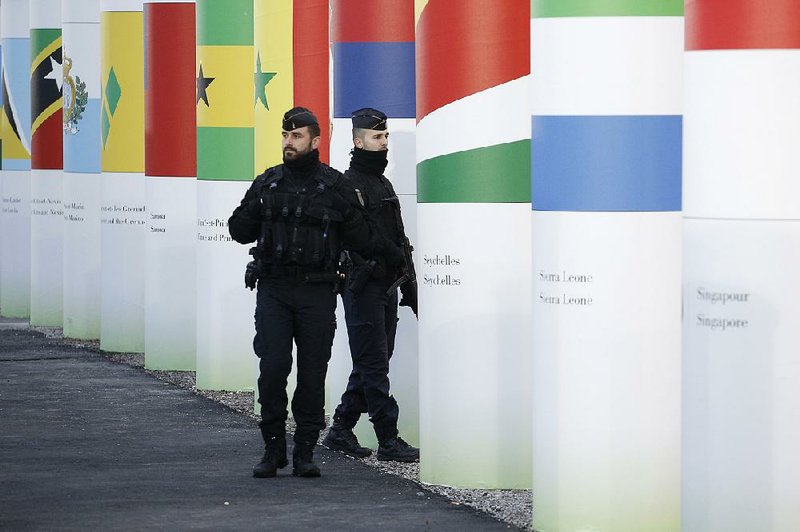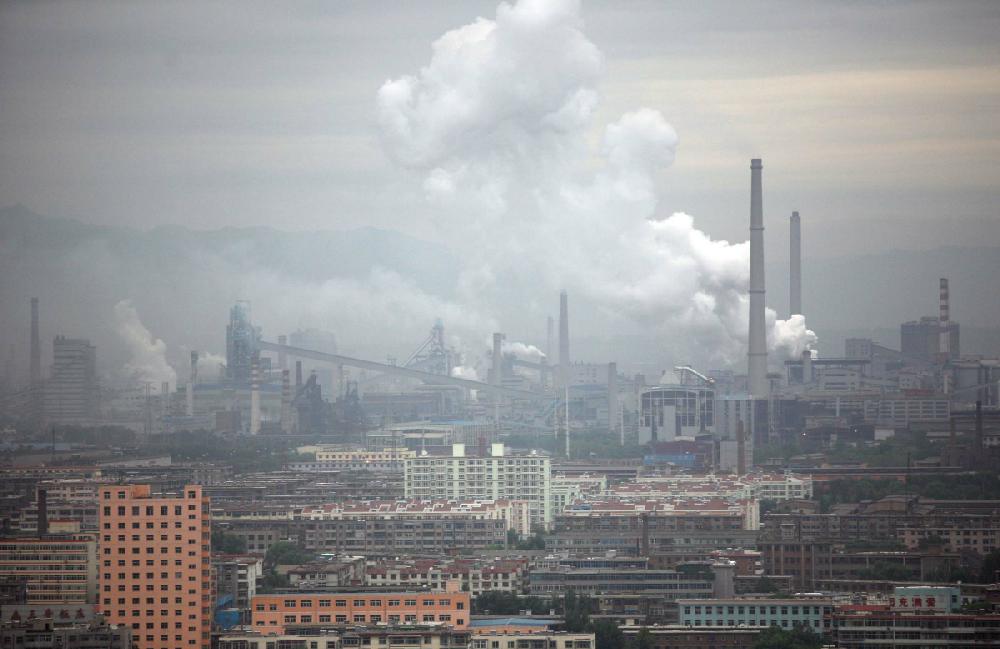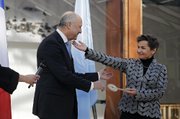PARIS -- The international conference on climate change that opens Monday in Paris is widely expected to produce a historic agreement among nations to reduce greenhouse-gas emissions that scientists say cause global warming.
Laurent Fabius, the French foreign minister, said Saturday that 183 countries accounting for nearly 95 percent of global greenhouse-gas emissions have submitted plans for how they would reduce emissions.
"This," said Fabius, speaking to reporters at the tightly secured summit venue, "is radically new."
Yet for all the potential for Paris to deliver a transformative and unifying moment -- with diverse leaders gathering in a city shaken by recent terrorist attacks in order to confront a different kind of threat -- experts say that on a practical level, it might prove just another steppingstone in the long stop-start international effort to address climate change.
As Fabius acknowledged, the plans of the 183 countries are projected to limit global warming by between 2.7 and 3.5 degrees Celsius -- not the 2-degree threshold at which scientists say most of the worst effects of climate change could be avoided.
The likelihood that the current goals will fall short of the 2-degree target is one of many reasons experts emphasize another urgent goal in Paris: to ensure that nations agree to regularly revisit the terms of whatever deal they reach.
"It's very important that we not lock into place the initial offers that countries have put on the table," said Alden Meyer, the director of policy and strategy for the Union of Concerned Scientists.
"We need to have, by the end of this decade, an initial review of where we are at and what more can be done to lift ambition," Meyer added. "And countries need to be prepared to review and revise upward their initial offers."
The Paris summit is the most highly anticipated gathering in the more than two decades since the United Nations Framework Convention on Climate Change began holding meetings around the world.
At the most well-known of those meetings, in Kyoto, Japan, in 1997, developed countries agreed to binding emissions cuts that would take effect in 2005. The United States, however, never signed the agreement because it was not approved by the Senate.
Obama's push
Obama is to arrive in Paris tonight. He is expected to stay for two days, and Secretary of State John Kerry will lead the U.S. delegation in later stages of the conference.
The Obama administration supports what its negotiators have called a hybrid agreement in which some of the goals outlined would be legally binding and others would not. The administration supports binding rules that require countries to track and report how they are pursuing their emissions targets but not making the targets themselves binding.
In recent days, Kerry has stated that the U.S. will not agree to binding limits. His comments initially prompted anger from French President Francois Hollande, but Fabius later said a hybrid plan could work. He acknowledged the complicated domestic politics in the United States and elsewhere.
"It would be pointless to come up with an accord that would be eventually rejected by either China or the U.S.," Fabius told the Financial Times.
Obama's administration has spent months pushing for global action on climate change.
"[Obama] comes to Paris with a moral authority that no other president has had on the issue of climate change," said Douglas Brinkley, a presidential historian at Rice University who noted that Obama's domestic climate efforts already stand alone in American history. "No other president has had a climate-change policy. It makes him unique."
The negotiations of the world leaders aim to forge a climate-change accord that would, for the first time, commit almost every country to lowering its greenhouse gas pollution. All year, Obama's negotiators have worked behind the scenes to fashion a Paris deal.
Crucial to Obama's leverage has been the release of his domestic climate-change regulations, which he then pushed other countries to emulate. So far, at least 170 countries have put forth emission-reduction plans.
But even as Obama presses for a deal in Paris, such a deal faces steep obstacles, not least the legal and legislative assault on his own regulations at home. During the course of the Paris talks, Republicans in Congress are planning a series of votes to fight Obama's climate agenda. More than half the states are suing the administration on the legality of his climate plan. And all the Republican presidential candidates have said that they would undo the regulations if elected.
On Nov. 19, Sen. James Inhofe, R-Okla., chairman of the environment committee and the Senate's most vocal skeptic on climate-change science, and Sen. John Barrasso, R-Wyo., sent a letter to Obama, signed by 35 other senators, promising to block the funding for any climate deal unless the Paris pact is sent to Congress for ratification.
"Our constituents are worried that the pledges you are committing the United States to will strengthen foreign economies at the expense of American workers," the senators wrote. "They are also skeptical about sending billions of their hard-earned dollars to government officials from developing nations."
Obama is pushing forward nonetheless. He unveiled the rules on curbing heat-trapping greenhouse gas emissions with a tight timeline, ensuring that they would be finalized before he leaves office. He has raised the issue of climate change in dozens of speeches and with every recent visiting foreign leader. In Washington, a team of environmental lawyers is preparing to defend the rules in court, while at the State Department, climate envoys are in constant contact with their counterparts around the world.
If his domestic regulations and a Paris accord withstand efforts to gut them, "climate change will become the heart and soul of his presidency," Brinkley said.
security heightened
Extra-tight security measures were implemented for the U.N. talks after Islamic extremists killed 130 people in Paris on Nov. 13.
Organizers said 147 heads of government and state will attend Monday's opening of the climate talks, which will take place at Le Bourget, an airport about 9 miles north of Paris where an international air show is held every two years. The site will officially be U.N. territory during the duration of the talks. Some of the leaders plan to stay in Paris.
The city is still recovering from the attacks by the Islamic State at a stadium, restaurants and concert hall. While museums, cultural venues, street markets, and metro stations that were closed after the attacks have all reopened, crowds of Parisians continue to flock to impromptu memorials at the sites of the killings.
Security was planned to be tight even before the attacks, given the array of government leaders attending.
French Interior Minister Bernard Cazeneuve said Saturday that just under 1,000 people thought to pose security risks have been banned from entering the country since tighter border controls were enforced earlier this month in the run-up to the talks and in the aftermath of France's deadliest attacks in recent memory.
France has mobilized 2,800 police to guard the site. Nearly 15,000 police and customs officials are manning the borders, Cazeneuve said. He has previously described an "unprecedented" number of mobile police ready to respond to threats.
A march by environmental activists was canceled because of the security measures. Activists are still planning other small actions around France and other countries.
Greenpeace anchored a hot-air balloon next to the Eiffel Tower on Saturday bearing the words "rise up for renewables."
Information for this article was contributed by William Yardley and Alexandra Zavis of Los Angeles Times; by Thomas Adamson, Elaine Ganley, Nico Garriga and Theodora Tongas of The Associated Press; by Tara Patel, Gregory Viscusi, Andrew Roberts, Andrea Rothman, Alex Morales, Alex Nussbaum and Angeline Benoit of Bloomberg News; and by Coral Davenport of The New York Times.
A Section on 11/29/2015


